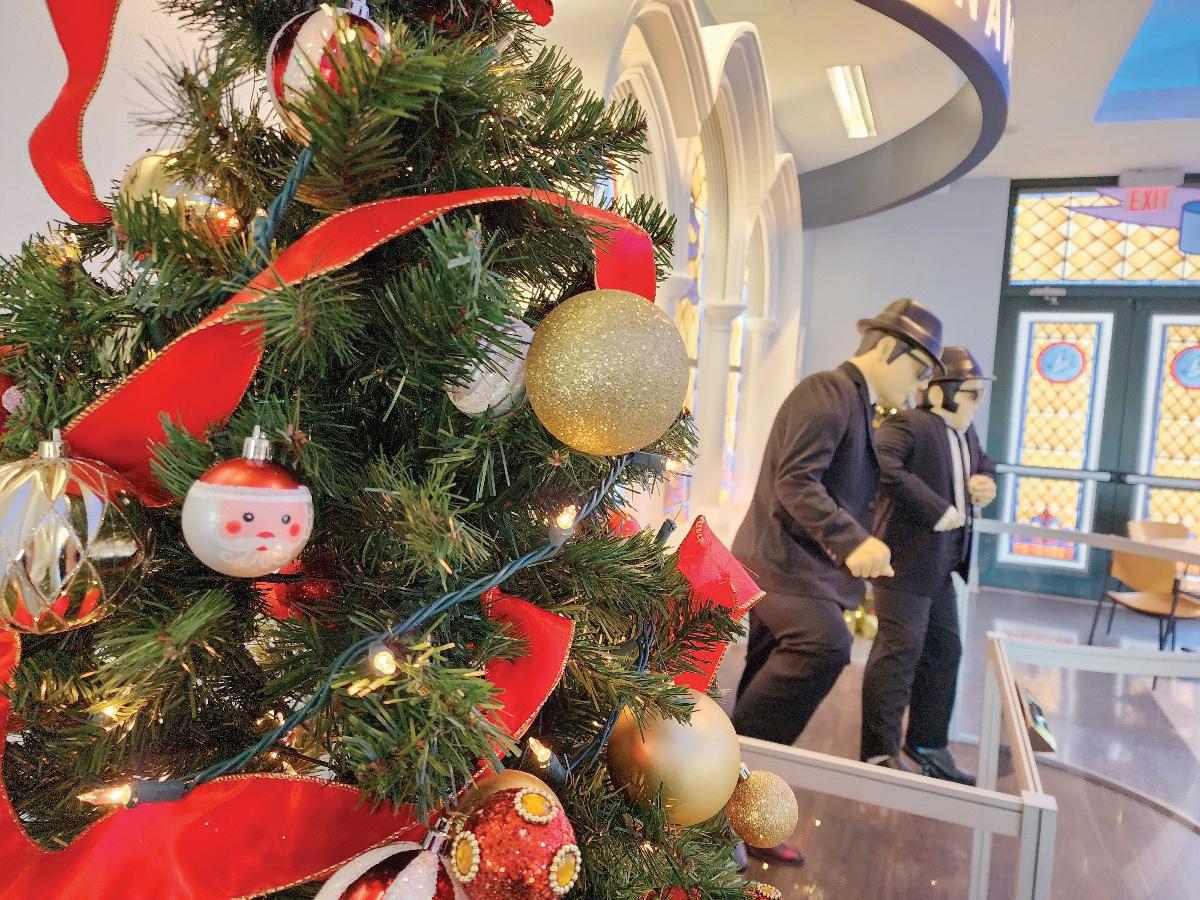

The Plainfield Saints football team, Pop Warner 13under D2 league recently competed at Nationals in Orlando, Florida after winning the State Championship and Regionals in Chesterton, IN





The Plainfield Saints football team, Pop Warner 13under D2 league recently competed at Nationals in Orlando, Florida after winning the State Championship and Regionals in Chesterton, IN


Cook County Board President Toni Preckwinkle today announced the inaugural recipients of the Digital Equity IMPACT Small Grants Program, a groundbreaking initiative designed to promote digital inclusion through storytelling and community engagement.
A total of 15 organizations across Cook County have been awarded grants of $7,500 or $15,000, depending on the size and scope of their projects. These organizations will use the funding to amplify community voices, address digital divides and create impactful narratives that advocate for equitable digital access.
One of the $15,000 Empowerment Grant Awardees winners is the Niles Public Library.
The library is joined by Chamber57, Corazon Community Services , Growing Community Media , HANA Center , Harper College Educational Foundation, LatinX Digital Leaders Now (LatinX DLN), Markham Public Library, scaleLIT and The Quilt Corporation NFP.
Winners of the $7,500 Boost Grant Awardees are Dorothy A. Swope Foundation, Lucky Jefferson, North Riverside Library, River Oaks Community Education and Development Corporation (ROC ED) and The Record Community News Group.
Funded by the American Rescue Plan Act (ARPA) and totaling $187,500, the Digital Equity IMPACT Small Grants Program was developed in partnership with City Bureau, a nonprofit journalism lab renowned for its innovative approach to local media and community-centered storytelling. This initiative is an extension of Cook County’s Digital Equity Action Plan, which prioritizes the key pillars of access, confidence, safety and infrastructure as the foundation for a connected and inclusive County.
“We are thrilled to celebrate these dedicated organizations that are leading the charge in advancing digital equity in their communities,” said Cook County Board President Toni Preckwinkle. “These awardees are driving meaningful change and have demonstrated an inspiring commitment to addressing digital inclusion through storytelling. Together, we are paving the way for a more just and equitable digital future across Cook County.
The grant recipients reflect the rich diversity of Cook County’s communities and showcase innovative approaches to promoting digital equity. These organizations include grassroots nonprofits, cultural institutions and advocacy groups. Project highlights include initiatives to increase digital literacy among senior citizens,
multimedia storytelling on the effects of the digital divide on youth, and community-led campaigns to promote access to affordable internet resources.
Kyla Williams Tate, Director of Digital Equity for the Cook County Office of the President, emphasized the role of these projects in driving change. “The work being undertaken by these organizations is both inspiring and essential. By supporting their storytelling efforts, we are shedding light on systemic barriers to digital access while also showcasing innovative, community-driven solutions to bridge the gap. These stories will help shape a brighter, more connected future for all residents.”
“When I learned we received the IMPACT Grant, my heart soared for my beloved Summit, IL, where the digital divide isn’t just a statistic—it’s personal. At LatinX Digital Leaders Now, we know that true change flows through the heart of community. We’re weaving together a tapestry of support – our schools, our library, and our local businesses. But most precious of all is our Latino community, whose resilience and strength inspire everything we do. Together, we’re writing a new chapter where everyone, from our abuelos to our little ones, can thrive in this digital age,”
You may spend many decades contributing to your IRA and 401(k), but eventually you will likely need to take the money out — in fact, you must take the money out or face penalties. What should you know about these mandatory withdrawals?
Here are some of the basics:
• What are they called? Mandatory withdrawals are technically called required minimum distributions, or RMDs.
• When must I take RMDs? If you were born before 1951, you’ve probably already begun taking RMDs. If you were born between 1951 and 1959, your RMD age is 73. And if you were born in 1960 or later, your RMD age is 75. You can postpone accepting your first RMD until April 1 of the year after you reach your RMD age, but this will result in two RMDs for the year. After you take your first RMD, you must take subsequent ones by December 31 of each year.
• What penalties will be assessed if I don’t take all my RMDs? For every dollar not withdrawn, the IRS will charge a 25% penalty, but this can drop to 10% if you subsequently withdraw the correct amount within two years.
• Which accounts have RMDs? RMDs apply to traditional IRAs, as well as other types of IRAs, including SIMPLE and SEP IRAs. RMDs don’t apply to Roth IRAs. RMDs also apply to traditional 401(k)s, but not Roth 401(k)s.
• Can I withdraw more than the RMD for any given year? Yes, you are free to take out as much as you want. However, if you take out more than the RMD for one year, you can’t apply the excess to the RMD for the next year.
• How are RMDs calculated? Typically, your RMDs are determined by dividing your account balance from the prior December 31 by a life expectancy factor published by the IRS. Your financial professional should be able to perform this calculation for you.
• If I have multiple accounts, do I have to take an RMD from each one? If you are taking RMDs from a traditional IRA, you must calculate each RMD individually, but you can take the total amount from one or more IRAs. If you’re taking RMDs from a 401(k) or similar plan, you must take the RMD from each of your accounts.
said Caroline Sanchez Crozier, CEO and Founder, Latinx Digital Leaders Now (Latinx DLN).
“The IMPACT Small Grants program will enable The Record to expand our Youth in Journalism Workshop, a free program for individuals aged 16–22 in suburban Cook County. Participants receive a stipend and learn directly from leaders in the field. Some may pursue careers in journalism, while others gain a deeper understanding of trusted storytelling and its critical role in their community. Access to honest, reliable information empowers residents, and empowered residents engage more effectively to better their communities,” said Ryan Osborn, Director of Development, The Record Community News Group.
The Power of Storytelling City Bureau played a central role in designing and implementing the Digital Equity IMPACT Small Grants Program. The organization provided training, resources, and mentorship to grant recipients to ensure their projects could maximize impact.
“Every community has a story worth sharing, especially when it comes to digital equity,” said Morgan Malone, Executive Director of City Bureau. “Through this program, we’ve worked alongside Cook County to empower local organizations to el-
evate their voices and create powerful narratives that address the digital challenges they face. These stories are not just about the struggles but also the solutions and successes. Together, we are building a coalition of storytellers advocating for a more inclusive and equitable digital landscape.”
Advancing a Vision of Digital Inclusion
The awarded projects align closely with the four pillars of Cook County’s Digital Equity Action Plan. By focusing on access, confidence, safety and infrastructure, these initiatives will drive positive, tangible and community-led change. The stories produced will inform policy discussions and help bridge the digital divide.
“Digital equity is about more than technology; it’s about opportunity and connection,” said President Preckwinkle. “This program exemplifies our commitment to ensuring all Cook County residents can thrive in an increasingly digital world. Congratulations to the awardees—you are paving the way for a future where no one is left behind.”
For more information about the Cook County Digital Equity IMPACT Small Grants Program and updates on the awardees’ projects, please visit www.cookcountyil.gov/service/ digital-equity.
• How are RMDs taxed? You are typically taxed at your income tax rate on the amount of the withdrawn RMD. You may be able to avoid taxes in a particular year if you transfer your RMDs to a qualified charity in what’s known as a qualified charitable distribution.
• If I inherit an IRA or 401(k), am I subject to RMDs? Yes. When you take RMDs from an inherited account, you generally must withdraw all the funds within 10 years, as opposed to over your lifetime, which is the RMD window that applies to your own accounts. The rules are somewhat different if you inherit an IRA or 401(k) from your spouse. In any case, though, you’ll want to consult with your tax advisor about how to take RMDs from an inherited account.
If you’re already subject to RMDs, be sure you’ve taken them before the year ends. And if you haven’t yet started taking RMDs, learn as much as you can about them — because the more you know, the more likely you’ll make the right moves at the right time.






This year, bring your little ones to the most exciting, family-friendly New Year’s event in Joliet – the Ultimate Kids’ New Year’s Eve EVE Party!
The clock may strike midnight for adults, but for the kids, the celebration begins early with a packed schedule of fun-filled activities, games, and entertainment that will make them feel like they’re ringing in the new year, too! It all happens at the Joliet Area Historical Museum on Dec. 30th from 11am to 1:30pm!
What’s in Store for Kids:
• New Year’s Eve Countdown Party: A kid-friendly countdown complete with a balloon drop, and music to help them celebrate before the clock strikes midnight (in kid time, of course!).
• Arts & Crafts Station: Let your little artists create festive decorations and New Year’s keepsakes to take home.
• Happy New Year’s Station: Learn tricks from all over the world that will bring you luck for a happy new year!
• DJ Dance Party: Kids can bust a move to their favorite tunes with a
kid-friendly DJ spinning the latest hits.
• Early Countdown: Kids will enjoy their very own early countdown at noon, complete with a balloon drop to mark the occasion!
• New Year’s Party Favors: Every child will leave with party favors, including noise makers, hats, and special treats to celebrate the season.
Parents can relax knowing their children are enjoying a safe, exciting, and supervised event. With plenty of activities to keep kids engaged, everyone will have an unforgettable time as they say goodbye to the old year and welcome in the new one!
*This is NOT a drop off program. All children must be accompanied by an adult. Adults will pay regular museum admission price.
Cost is $12 for kids ages 3-12
Early registration is encouraged. For more information or to purchase tickets, visit www.jolietmuseum.org or call (815) 723-5201





Notice is hereby given that a public hearing will be held by the Village of Niles Planning and Zoning Board on Monday, January 6, 2025 at 6:00 P.M. in the Council Chambers of the Niles Municipal Building, 1000 Civic Center Drive, Niles Illinois, to hear the following matter(s):
25-ZP-01
Silvia Szatmari of 8032 Kilpatrick Ave, Skokie, IL 60076, is requesting approval of a Special Use Permit per Village of Niles Zoning Ordinance Appendix B Section 8.2(A) for ‘Pet Services - Grooming’ at 7629 N Milwaukee Ave, Niles, IL 60714.
Pin #: 09-25-211-049-0000 & 09-25-211-016-0000
25-ZP-02
Maryam Bozai of 8609 Lillibet Ter, Niles, IL 60714 is requesting approval of a Special Use Permit per Village of Niles Zoning Ordinance Appendix B Section 8.2(A) for a ‘Day Care Center’ at 7124 W Touhy Ave, Niles, IL 60714.
PIN #: 10-30-321-018-0000
All persons interested should attend and will be given an opportunity to be heard. For additional information regarding the above case(s) or should any individual need auxiliary aid or service, such as sign language interpreter or materials in alternative formats, please contact the Village of Niles Community Development Department at 847-588-8000.
Published December 19, 2024



More than five years after Illinois began issuing permits for legal production of industrial hemp, Gov. JB Pritzker said Friday he now favors legislation to bring the industry under tighter regulation.
At a news conference in Chicago, Pritzker said in the short time since both the state and federal governments legalized hemp production, a new industry has emerged in which chemicals are extracted from hemp plants to produce intoxicating and potentially dangerous products that are currently unregulated.
“Commonly known as intoxicating hemp, this industry is selling hemp-derived products such as delta-8, and they’re using deceptive advertising tactics to market them directly to minors,” Pritzker said. “These products have an intoxicating effect, often to dangerous levels. They’re untested and unregulated and are widely available and accessible to young people.”
Illinois lawmakers passed legislation in 2018 to allow the commercial production of hemp, the same year Congress legalized hemp nationwide through the 2018 Farm Bill. The crop was once commonly used in the United States to make rope, textiles and other products, but it was effectively banned decades ago because of its close botanical relationship with marijuana.
The legislation legalizing hemp anticipated it would again be used to make industrial products, but also for the production of CDB oils that can be extracted from the plant. Those oils, and products made with them, have become popular due to the belief that they have multiple health

benefits.
But the recent boom of intoxicating hemp-derived products has raised new concerns about the need for additional regulation.
House Bill 4293, which originally dealt with regulation of massage therapists, passed out of the House last spring and was sent to the Senate where it was stripped of its original language and replaced with new language regulating intoxicating hemp-derived products.
The bill would not ban such products but would impose limits on the amount of the intoxicating substance THC they can contain, and it would regulate how those products can be marketed and advertised. It also limits the manufacture and sale of those prod -
ucts to licensed businesses.
The amended bill passed out the Senate 54-1 in May and was sent back to the House where no further action has been taken.
“It is vital we move forward towards regulation of hemp and delta-8 products and do so in a way that is equitable and provides opportunities within the evolving industry,” Senate Majority Leader Kimberly Lightford, D-Westchester, said during the news conference. “We support the hemp industry. This is not an effort to bash the hemp industry. We want the hemp industry to survive and thrive and continue evolving.”
The push to impose new limits on the production and sale of intoxicating hemp comes at the same time the Illinois Depart -
ment of Agriculture has been working to develop new state regulations to bring the Illinois industry into compliance with new federal regulations.
The legislative Joint Committee on Administrative Rules, which oversees the administrative rulemaking process, gave its approval to those rules Tuesday. That came after extensive negotiations with the Illinois Hemp Business Association, a lobby group that represents many small, minorityowned hemp businesses.
In a statement, the association said this week it was satisfied with the final negotiated version of the administrative rules, but still had significant concerns about the new hemp regulation bill. The association sayid it “threatens the industry by potentially banning
beneficial components of the hemp plant.”
But the Cannabis Business Association of Illinois, which represents the cannabis industry, issued a statement Friday supporting the legislation.
“We applaud Gov. JB Pritzker’s call to protect consumers and rein in the gray market,” the group’s executive director Tiffany Chappell Ingram said in a statement. “We urge lawmakers to take swift action, as Illinois is already falling behind other states that have adopted meaningful regulations.”
Lawmakers are expected to consider the bill during an upcoming lame duck session, which is tentatively scheduled to begin Thursday, Jan. 2.


